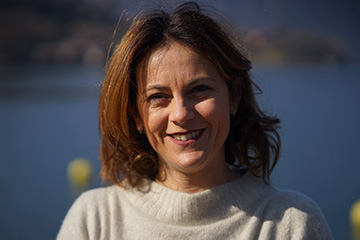
Francesca Bragheri
In this installment of Senior Member Insights, OPN talks with Francesca Bragheri, a researcher at the Institute for Photonics and Nanotechnologies of the Italian National Research Council in Milan. Bragheri received her Ph.D. in Electronic Engineering at the University of Pavia and carried out her research activity as a postdoc at the Quantum Electronics Lab, University of Pavia. As a member of the Virtual Institute for Nonlinear Optics, she spent some months in collaborations at the University of Insubria in Como and at Vilnius University in Vilnius, Lithuania.
Her research activity has been mainly devoted to the numerical and experimental study of radiation–matter interaction in guided-wave structures and bulk materials. Currently, her research interests are related to developing new optofluidic lab-on-chip devices for optical manipulation and 3D imaging of single cells and clusters without physical contact, and to their fabrication by femtosecond laser irradiation followed by chemical etching.
What first interested you in pursuing science?
Miniaturization! When I decided to take engineering studies, I was still uncertain about what orientation appealed to me. I soon had the opportunity to attend a presentation on lasers. The passionate words of the speaker and my first-ever experience with a microchip containing more than 40 lasers intrigued me so much that I decided optics would be my focus.
What aspect of your current work do you find the most interesting or exciting?
I still find it exciting that a large experimental apparatus can be integrated into a single millimeter-sized chip. But nowadays, the implementation of research and usage of designed devices is far more interesting than miniaturization itself. The idea that a device I’m working on might contribute to the future of cancer therapies is a major and irresistible driving force in my current research activity.
What tips for successful networking do you have for early-career professionals?
Never be shy or afraid about your knowledge. Instead, try to be as prepared as you can and focus on growing constantly. Keep pursuing contacts and friendships from the early stage of your career—these might become fruitful collaborations in the future.
What professional resources do you rely on to stay active and engaged with your field?
Conferences and journals may sound obsolete in this modern world of social media, but to me, they are still the main source of news flow. Anyway, keeping an eye open on Twitter and LinkedIn can be noteworthy to check the latest development from other teams.
What’s the best career decision you’ve ever made, and why?
In 2006, I accepted the proposal to work on a new research field at the end of my Ph.D. At that time, I was engaged in nonlinear optics, focusing on conical-wave formation. It was a very exciting field from a theoretical point of view, but with limited applications. I then moved to biophotonics, which appealed to me much. Some years later, I am really happy about the choice, since my work on optics applied to single-cell analysis is a fascinating field that might become important in future medicine.
Describe a major turning point in your career. Was there a specific action/accomplishment that got you there?
After a few years as a Ph.D. at the University of Pavia, I moved to the Institute for Photonics and Nanotechnologies in Milan, and I started to collaborate with a very motivating group. I then got assigned a permanent position and could achieve some fulfilling objectives (such as coordinating a project).
What is one piece of advice that you wish you were given as a student/early in your career?
Be passionate and try hard to develop your ideas. It’s important to dream high at the start of a career. Changes in the research activity may happen in the years after; that should not be perceived as a defeat but rather as the birth of a new idea.
How important are leadership roles in career development, and how do you hone your leadership skills?
In Italy, the major steps in a career are usually through examinations and competitions. Leadership intended to coordinate research and/or a project is a skill much acknowledged, so it’s quite important. For my development, I always looked at my boss or other senior professors’ behavior, focusing on the conduct that appealed to me most. These are the principles I am trying to replicate now that I coordinate a group of students.
At this point in your career, what are you most looking forward to next?
After leading a FET [Horizon 2020 Future and Emerging Technologies] project, my main goal now would be to be granted funding for an individual project (e.g., via winning an ERC [European Research Council grant]) to bring forward my research activity and fully supervise a research group. That could be performed even in the lab I already work in, not necessarily in a new lab.
If you weren’t in the sciences, what would be your dream career?
When I was a child, I dreamt of being a runner, and sometimes I wished to become a chef. Activity in research is somehow similar to running a marathon, and when I do experiments in the lab, I mix ingredients anyway. So, I may have fulfilled my dreams. Surely, my main objective in any field is to do something that can drive improvements and help others, and even a scientist can achieve such a target.
